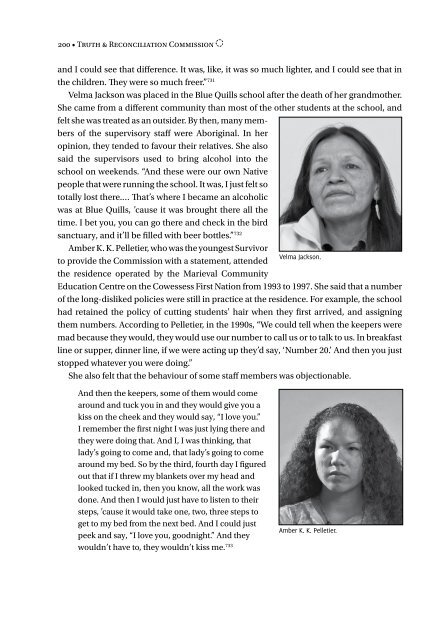The Survivors Speak
1MB8J05
1MB8J05
You also want an ePaper? Increase the reach of your titles
YUMPU automatically turns print PDFs into web optimized ePapers that Google loves.
200 • Truth & Reconciliation Commission<br />
and I could see that difference. It was, like, it was so much lighter, and I could see that in<br />
the children. <strong>The</strong>y were so much freer.” 731<br />
Velma Jackson was placed in the Blue Quills school after the death of her grandmother.<br />
She came from a different community than most of the other students at the school, and<br />
felt she was treated as an outsider. By then, many members<br />
of the supervisory staff were Aboriginal. In her<br />
opinion, they tended to favour their relatives. She also<br />
said the supervisors used to bring alcohol into the<br />
school on weekends. “And these were our own Native<br />
people that were running the school. It was, I just felt so<br />
totally lost there.… That’s where I became an alcoholic<br />
was at Blue Quills, ’cause it was brought there all the<br />
time. I bet you, you can go there and check in the bird<br />
sanctuary, and it’ll be filled with beer bottles.” 732<br />
Amber K. K. Pelletier, who was the youngest Survivor<br />
Velma Jackson.<br />
to provide the Commission with a statement, attended<br />
the residence operated by the Marieval Community<br />
Education Centre on the Cowessess First Nation from 1993 to 1997. She said that a number<br />
of the long-disliked policies were still in practice at the residence. For example, the school<br />
had retained the policy of cutting students’ hair when they first arrived, and assigning<br />
them numbers. According to Pelletier, in the 1990s, “We could tell when the keepers were<br />
mad because they would, they would use our number to call us or to talk to us. In breakfast<br />
line or supper, dinner line, if we were acting up they’d say, ‘Number 20.’ And then you just<br />
stopped whatever you were doing.”<br />
She also felt that the behaviour of some staff members was objectionable.<br />
And then the keepers, some of them would come<br />
around and tuck you in and they would give you a<br />
kiss on the cheek and they would say, “I love you.”<br />
I remember the first night I was just lying there and<br />
they were doing that. And I, I was thinking, that<br />
lady’s going to come and, that lady’s going to come<br />
around my bed. So by the third, fourth day I figured<br />
out that if I threw my blankets over my head and<br />
looked tucked in, then you know, all the work was<br />
done. And then I would just have to listen to their<br />
steps, ’cause it would take one, two, three steps to<br />
get to my bed from the next bed. And I could just<br />
peek and say, “I love you, goodnight.” And they<br />
wouldn’t have to, they wouldn’t kiss me. 733<br />
Amber K. K. Pelletier.


